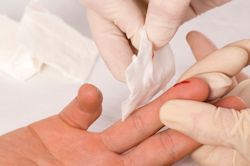Work Practice Controls
Work practice controls focus on the manner in which tasks are performed.

The following are some work practice controls associated with universal precautions:
- Hand hygiene: Workers should wash their hands regularly with soap and water or use hand sanitizers before and after contact with patients, and after removing gloves.
- Personal Protective Equipment (PPE): Workers should wear appropriate PPE such as gloves, gowns, masks, and eye protection when there is a risk of exposure to blood or other body fluids.
- Safe injection practices: Workers should use single-use needles and syringes and never reuse them. They should also avoid recapping needles and dispose of sharps in puncture-resistant containers.
- Environmental cleaning and disinfection: Facilities should maintain a clean and safe environment by routinely cleaning and disinfecting surfaces and equipment that come into contact with patients.
- Respiratory hygiene and cough etiquette: Workers and healthcare patients should cover their coughs and sneezes with a tissue or their elbow and dispose of the tissue properly.
- Safe handling and disposal of contaminated waste: Workers should handle and dispose of contaminated waste materials such as used bandages, gloves, and dressings properly to prevent the spread of infection.
- Post-exposure management: Facilities should have procedures in place for managing exposures to bloodborne pathogens, including reporting and follow-up with affected employees.
Knowledge Check Choose the best answer for the question.
6-3. Which of the following is considered a safe work practice associated with universal precautions?
You forgot to answer the question!
